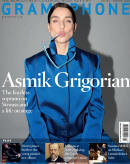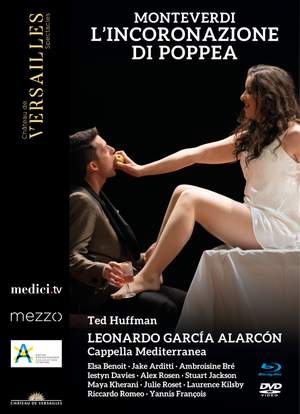Texte paru dans: / Appeared in:
Château de Versailles CVS118
|
|
|
Outil de traduction |
|
|
This production of Monteverdi’s last operatic masterpiece was filmed on the stage of the Opéra Royal at Versailles in January last year but is a co-production with the Aix-en-Provence Festival, where it premiered in 2022. Director Ted Huffman talks of the work’s ‘resolutely playful atmosphere without fatalism’, which seems a fair description of what he has achieved here. Played out on a plain, open stage with a few tables and chairs for a set, it profits from vividly realistic acting by its smartly modern-dressed performers; realism and depth, after all, are what has been handed to them with timeless genius by Busenello’s libretto and Monteverdi’s music, and it is received gratefully.
Light-hearted scenes such as the palace guards’ grumblings or Valetto’s mocking of Seneca are playful yet always natural, never silly. More dramatic moments such as Nerone’s petulant sentencing of Seneca and the great sage’s suicide, or the agonies of Ottone, Ottavia and Drusilla, articulate their horror with a grim pragmaticism that implies we might all behave in the same awful ways in similar circumstances. In this production, characters not currently involved in the action sit round the edges of the stage, not reacting but, you suspect, plotting their next move. For despite the fight for supremacy between Amore and the other gods outlined in the prologue, dangerous human ambition and weakness are what really drive the action here.
Poppea is, of course, one of the most famously sexy operas out there – few could ever imagine that Nerone’s ‘love’ for his mistress stems from anything but lust. Realisations of this have been mixed over the years, from the fumblingly awkward to the writhingly over-eager, but this production scores with its emphasis on the act of seduction. For this much credit goes to the superb Poppea of Elsa Benoît, whose erotic aura – radiating from her stealthily purposeful teasings but even more so in the film’s close-ups of her face – is compelling. When she entices Nerone’s friend Lucano into a threesome she becomes an irresistible force; it seems no man can stand against her. Benoît has already played two Baroque sirens in Handel’s Poppea (Agrippina) and Semele, as well as Carmen, and frankly you can see why she gets asked.
The rest of the cast exude quality, too. Jake Arditti (who has played Handel’s and Monteverdi’s Nerone before) appears manly and arrogant in his imperial swagger but is a helpless boy in the face of Poppea’s allure; Ambroisine Bré is a noble but dangerous Ottavia; and Iestyn Davies plays Ottone as an everyman as weak-willed as the rest of us. All sing with opera-house levels of projection without damage to the music’s clarity or expressive intimacy, and so do the rest of the cast: Alex Rosen’s sonorous and authoritative Seneca, Stuart Jackson in his stately and enormous drag-double of Arnalta and Nutrice, Maya Kherani as a nervy Drusilla and Julie Roset as Amore and Valetto, the latter accelerating into frustrated childish jibber as he rips up Seneca’s little book of stoicisms. As Lucano, newcomer Laurence Kilsby sounds like a tenor to listen for. Leonardo García Alarcón and Cappella Mediterranea are experts at this repertoire and play with skill, commitment, energy and some innovative continuo devices to reflect, emphasise and punctuate the singers. The action never flags, one’s attention never wanders. Although irritated by a large section of piping suspended over the stage for no discernible reason (though luckily out of shot most of the time), I found this a Poppea worthy of its creators’ eternally modern genius. |
|




